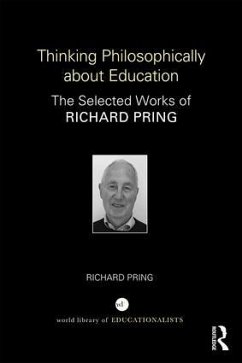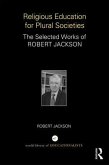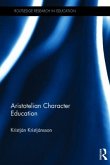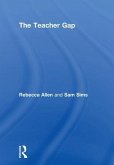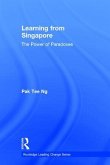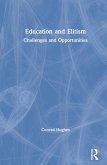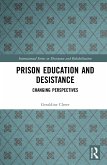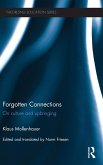- Gebundenes Buch
- Merkliste
- Auf die Merkliste
- Bewerten Bewerten
- Teilen
- Produkt teilen
- Produkterinnerung
- Produkterinnerung
Highlighting key writings from Professor Richard Pring's international career in education, the texts in this book provide a historical perspective in relation to current debates about philosophy of education in the UK and internationally, drawing attention to issues of current concern.
Andere Kunden interessierten sich auch für
![Religious Education for Plural Societies Religious Education for Plural Societies]() Robert JacksonReligious Education for Plural Societies168,99 €
Robert JacksonReligious Education for Plural Societies168,99 €![Aristotelian Character Education Aristotelian Character Education]() Kristján KristjánssonAristotelian Character Education177,99 €
Kristján KristjánssonAristotelian Character Education177,99 €![The Teacher Gap The Teacher Gap]() Rebecca AllenThe Teacher Gap147,99 €
Rebecca AllenThe Teacher Gap147,99 €![Learning from Singapore Learning from Singapore]() Pak Tee NgLearning from Singapore189,99 €
Pak Tee NgLearning from Singapore189,99 €![Education and Elitism Education and Elitism]() Conrad HughesEducation and Elitism167,99 €
Conrad HughesEducation and Elitism167,99 €![Prison Education and Desistance Prison Education and Desistance]() Geraldine CleerePrison Education and Desistance167,99 €
Geraldine CleerePrison Education and Desistance167,99 €![Forgotten Connections Forgotten Connections]() Klaus MollenhauerForgotten Connections199,99 €
Klaus MollenhauerForgotten Connections199,99 €-
-
-
Highlighting key writings from Professor Richard Pring's international career in education, the texts in this book provide a historical perspective in relation to current debates about philosophy of education in the UK and internationally, drawing attention to issues of current concern.
Produktdetails
- Produktdetails
- Verlag: Routledge
- Seitenzahl: 190
- Erscheinungstermin: 13. Dezember 2018
- Englisch
- Abmessung: 240mm x 161mm x 15mm
- Gewicht: 455g
- ISBN-13: 9781138325739
- ISBN-10: 1138325732
- Artikelnr.: 54802009
- Herstellerkennzeichnung
- Libri GmbH
- Europaallee 1
- 36244 Bad Hersfeld
- gpsr@libri.de
- Verlag: Routledge
- Seitenzahl: 190
- Erscheinungstermin: 13. Dezember 2018
- Englisch
- Abmessung: 240mm x 161mm x 15mm
- Gewicht: 455g
- ISBN-13: 9781138325739
- ISBN-10: 1138325732
- Artikelnr.: 54802009
- Herstellerkennzeichnung
- Libri GmbH
- Europaallee 1
- 36244 Bad Hersfeld
- gpsr@libri.de
Richard Pring is Emeritus Professor of Education, and was formerly Director of Department of Educational Studies, University of Oxford, UK.
Introduction
Part I Philosophy of Education: meaning and importance
Chapter 1 'From disguised nonsense to recognition of patent nonsense': thinking philosophically about education.
Chapter 2 Am I a critical realist?
Chapter 3 Philosophy of education according to John Dewey.
Part II Aims of Education
Chapter 4 What counts as an educated person?
Chapter 5 Putting persons back into education.
Chapter 6 Traditional or child-centred learning - a 'false dualism'?
Chapter 7 Preparing for citizenship: relevance of John Dewey.
Chapter 8 When is a 'university' not a 'university'? A changing concept.
Part III Teaching and Research
Chapter 9 Leadership: skilled manager or virtuous professional?
Chapter 10 Research into practice: action research and practitioner research.
Chapter 11 Teacher as researcher: relevance of John Dewey's pragmatism.
Part IV Context of Education
Chapter 12 Transformation of education: from public service to private gain.
Chapter 13 The common school
Part I Philosophy of Education: meaning and importance
Chapter 1 'From disguised nonsense to recognition of patent nonsense': thinking philosophically about education.
Chapter 2 Am I a critical realist?
Chapter 3 Philosophy of education according to John Dewey.
Part II Aims of Education
Chapter 4 What counts as an educated person?
Chapter 5 Putting persons back into education.
Chapter 6 Traditional or child-centred learning - a 'false dualism'?
Chapter 7 Preparing for citizenship: relevance of John Dewey.
Chapter 8 When is a 'university' not a 'university'? A changing concept.
Part III Teaching and Research
Chapter 9 Leadership: skilled manager or virtuous professional?
Chapter 10 Research into practice: action research and practitioner research.
Chapter 11 Teacher as researcher: relevance of John Dewey's pragmatism.
Part IV Context of Education
Chapter 12 Transformation of education: from public service to private gain.
Chapter 13 The common school
Introduction; Part I Philosophy of Education: meaning and importance; Chapter 1 'From disguised nonsense to recognition of patent nonsense': thinking philosophically about education.; Chapter 2 Am I a critical realist?; Chapter 3 Philosophy of education according to John Dewey.; Part II Aims of Education; Chapter 4 What counts as an educated person?; Chapter 5 Putting persons back into education.; Chapter 6 Traditional or child-centred learning - a 'false dualism'?; Chapter 7 Preparing for citizenship: relevance of John Dewey.; Chapter 8 When is a 'university' not a 'university'? A changing concept.; Part III Teaching and Research; Chapter 9 Leadership: skilled manager or virtuous professional?; Chapter 10 Research into practice: action research and practitioner research.; Chapter 11 Teacher as researcher: relevance of John Dewey's pragmatism.; Part IV Context of Education; Chapter 12 Transformation of education: from public service to private gain.; Chapter 13 The common school
Introduction
Part I Philosophy of Education: meaning and importance
Chapter 1 'From disguised nonsense to recognition of patent nonsense': thinking philosophically about education.
Chapter 2 Am I a critical realist?
Chapter 3 Philosophy of education according to John Dewey.
Part II Aims of Education
Chapter 4 What counts as an educated person?
Chapter 5 Putting persons back into education.
Chapter 6 Traditional or child-centred learning - a 'false dualism'?
Chapter 7 Preparing for citizenship: relevance of John Dewey.
Chapter 8 When is a 'university' not a 'university'? A changing concept.
Part III Teaching and Research
Chapter 9 Leadership: skilled manager or virtuous professional?
Chapter 10 Research into practice: action research and practitioner research.
Chapter 11 Teacher as researcher: relevance of John Dewey's pragmatism.
Part IV Context of Education
Chapter 12 Transformation of education: from public service to private gain.
Chapter 13 The common school
Part I Philosophy of Education: meaning and importance
Chapter 1 'From disguised nonsense to recognition of patent nonsense': thinking philosophically about education.
Chapter 2 Am I a critical realist?
Chapter 3 Philosophy of education according to John Dewey.
Part II Aims of Education
Chapter 4 What counts as an educated person?
Chapter 5 Putting persons back into education.
Chapter 6 Traditional or child-centred learning - a 'false dualism'?
Chapter 7 Preparing for citizenship: relevance of John Dewey.
Chapter 8 When is a 'university' not a 'university'? A changing concept.
Part III Teaching and Research
Chapter 9 Leadership: skilled manager or virtuous professional?
Chapter 10 Research into practice: action research and practitioner research.
Chapter 11 Teacher as researcher: relevance of John Dewey's pragmatism.
Part IV Context of Education
Chapter 12 Transformation of education: from public service to private gain.
Chapter 13 The common school
Introduction; Part I Philosophy of Education: meaning and importance; Chapter 1 'From disguised nonsense to recognition of patent nonsense': thinking philosophically about education.; Chapter 2 Am I a critical realist?; Chapter 3 Philosophy of education according to John Dewey.; Part II Aims of Education; Chapter 4 What counts as an educated person?; Chapter 5 Putting persons back into education.; Chapter 6 Traditional or child-centred learning - a 'false dualism'?; Chapter 7 Preparing for citizenship: relevance of John Dewey.; Chapter 8 When is a 'university' not a 'university'? A changing concept.; Part III Teaching and Research; Chapter 9 Leadership: skilled manager or virtuous professional?; Chapter 10 Research into practice: action research and practitioner research.; Chapter 11 Teacher as researcher: relevance of John Dewey's pragmatism.; Part IV Context of Education; Chapter 12 Transformation of education: from public service to private gain.; Chapter 13 The common school

